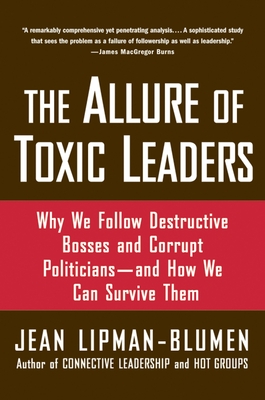A book on leadership that explains why so many followers not only tolerate bad leaders but in many cases actually prefer them.
Toxic leaders--such as Ken Lay at Enron or Al Dunlap ("Chainsaw Al") at Sunbeam, or Slobodan Milosevic in Yugoslavia--have always been with us, and many books explain what makes them tick. But in The Allure of Toxic Leaders, Jean Lipman-Blumen explains what makes the followers tick, exploring why we tolerate--and remain steadfastly loyal to--leaders who are destructive to their organizations, their employees, their nations, and their constituents. Why do we knowingly follow, seldom unseat, frequently prefer, and sometimes even create toxic leaders? Lipman-Blumen argues that these leaders appeal to our deepest needs, playing on our anxieties and fears, on our yearnings for security, high self-esteem, and significance, and on our desire for noble enterprises and immortality. The author explores how psychological needs--such as the desire to be at the heart of the action, to be an insider--can often make us susceptible to toxic leaders. She describes how followers inadvertently keep themselves in line by a set of insidious control myths that they internalize. In addition, outside forces--such as economic depressions, political upheavals, or a crisis in the company--can increase our anxiety and our longing for charismatic leaders. Equally important, Lipman-Blumen shows how followers, mired in the swamp of toxic leadership, can learn critical lessons for the future and survive in the meantime. She discusses how to confront, reform, undermine, blow the whistle on, or oust a toxic leader. And she suggests how we can diminish our need for strong leaders, identify "reluctant leaders" among competent followers, and even nurture the leader within ourselves. Toxic leaders first charm, but then manipulate, mistreat, weaken, and ultimately devastate their followers. The Allure of Toxic Leaders tells us how to recognize these leaders and identify the germ of toxicity within their "noble" visions before it''s too late.
Toxic leaders, both political, like Slobodan Milosevic, and corporate, like Enron''s Ken Lay, have always been with us, and many books have been written to explain what makes them tick. Here leadership scholar Jean Lipman-Blumen explains what makes the followers tick, exploring why people will tolerate--and remain loyal to--leaders who are destructive to their organizations, their employees, or their nations. Why do we knowingly follow, seldom unseat, frequently prefer, and sometimes even create toxic leaders? Lipman-Blumen argues that these leaders appeal to our deepest needs, playing on our anxieties and fears, on our yearnings for security, high self-esteem, and significance, and on our desire for noble enterprises and immortality. She also explores how followers inadvertently keep themselves in line by a set of insidious control myths that they internalize. For example, the belief that the leader must necessarily be in a position to "know more" than the followers often stills their objections. In addition, outside forces--such as economic depressions, political upheavals, or a crisis in a company--can increase our anxiety and our longing for charismatic leaders. Lipman-Blumen shows how followers can learn critical lessons for the future and survive in the meantime. She discusses how to confront, reform, undermine, blow the whistle on, or oust a toxic leader. And she suggests how we can diminish our need for strong leaders, identify "reluctant leaders" among competent followers, and even nurture the leader within ourselves. Toxic leaders charm, manipulate, mistreat, weaken, and ultimately devastate their followers. The Allure of Toxic Leaders tells us how to recognize these leaders before it''s too late.
Get The Allure of Toxic Leaders by at the best price and quality guranteed only at Werezi Africa largest book ecommerce store. The book was published by Oxford University Press Inc and it has pages. Enjoy Shopping Best Offers & Deals on books Online from Werezi - Receive at your doorstep - Fast Delivery - Secure mode of Payment
 Jacket, Women
Jacket, Women
 Woolend Jacket
Woolend Jacket
 Western denim
Western denim
 Mini Dresss
Mini Dresss
 Jacket, Women
Jacket, Women
 Woolend Jacket
Woolend Jacket
 Western denim
Western denim
 Mini Dresss
Mini Dresss
 Jacket, Women
Jacket, Women
 Woolend Jacket
Woolend Jacket
 Western denim
Western denim
 Mini Dresss
Mini Dresss
 Jacket, Women
Jacket, Women
 Woolend Jacket
Woolend Jacket
 Western denim
Western denim
 Mini Dresss
Mini Dresss
 Jacket, Women
Jacket, Women
 Woolend Jacket
Woolend Jacket
 Western denim
Western denim
 Mini Dresss
Mini Dresss




